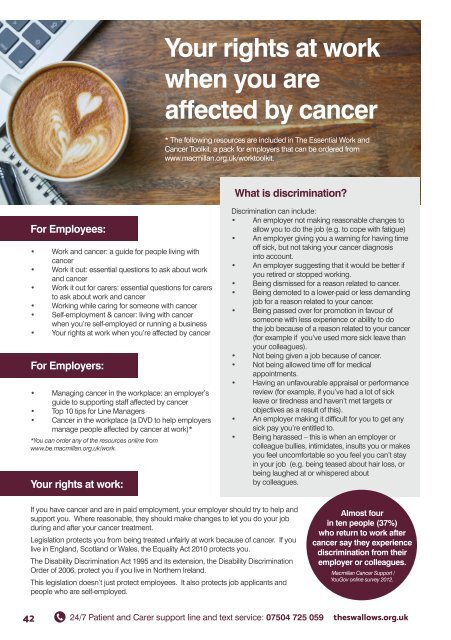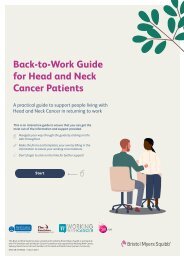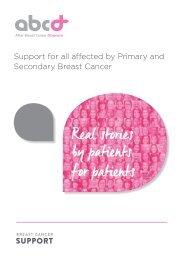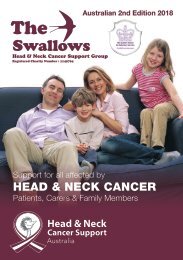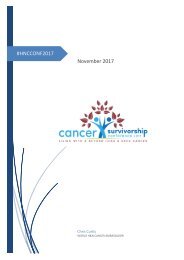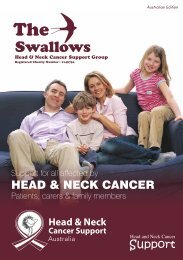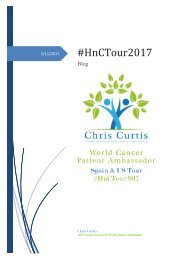SWALLOWS_PATIENT_BOOKLET_MAIN_110918
You also want an ePaper? Increase the reach of your titles
YUMPU automatically turns print PDFs into web optimized ePapers that Google loves.
Your rights at work<br />
when you are<br />
affected by cancer<br />
* The following resources are included in The Essential Work and<br />
Cancer Toolkit, a pack for employers that can be ordered from<br />
www.macmillan.org.uk/worktoolkit.<br />
What is discrimination?<br />
For Employees:<br />
• Work and cancer: a guide for people living with<br />
cancer<br />
• Work it out: essential questions to ask about work<br />
and cancer<br />
• Work it out for carers: essential questions for carers<br />
to ask about work and cancer<br />
• Working while caring for someone with cancer<br />
• Self-employment & cancer: living with cancer<br />
when you’re self-employed or running a business<br />
• Your rights at work when you’re affected by cancer<br />
For Employers:<br />
• Managing cancer in the workplace: an employer’s<br />
guide to supporting staff affected by cancer<br />
• Top 10 tips for Line Managers<br />
• Cancer in the workplace (a DVD to help employers<br />
manage people affected by cancer at work)*<br />
*You can order any of the resources online from<br />
www.be.macmillan.org.uk/work.<br />
Your rights at work:<br />
Discrimination can include:<br />
• An employer not making reasonable changes to<br />
allow you to do the job (e.g. to cope with fatigue)<br />
• An employer giving you a warning for having time<br />
off sick, but not taking your cancer diagnosis<br />
into account.<br />
• An employer suggesting that it would be better if<br />
you retired or stopped working.<br />
• Being dismissed for a reason related to cancer.<br />
• Being demoted to a lower-paid or less demanding<br />
job for a reason related to your cancer.<br />
• Being passed over for promotion in favour of<br />
someone with less experience or ability to do<br />
the job because of a reason related to your cancer<br />
(for example if you’ve used more sick leave than<br />
your colleagues).<br />
• Not being given a job because of cancer.<br />
• Not being allowed time off for medical<br />
appointments.<br />
• Having an unfavourable appraisal or performance<br />
review (for example, if you’ve had a lot of sick<br />
leave or tiredness and haven’t met targets or<br />
objectives as a result of this).<br />
• An employer making it difficult for you to get any<br />
sick pay you’re entitled to.<br />
• Being harassed – this is when an employer or<br />
colleague bullies, intimidates, insults you or makes<br />
you feel uncomfortable so you feel you can’t stay<br />
in your job (e.g. being teased about hair loss, or<br />
being laughed at or whispered about<br />
by colleagues.<br />
If you have cancer and are in paid employment, your employer should try to help and<br />
support you. Where reasonable, they should make changes to let you do your job<br />
during and after your cancer treatment.<br />
Legislation protects you from being treated unfairly at work because of cancer. If you<br />
live in England, Scotland or Wales, the Equality Act 2010 protects you.<br />
The Disability Discrimination Act 1995 and its extension, the Disability Discrimination<br />
Order of 2006, protect you if you live in Northern Ireland.<br />
This legislation doesn’t just protect employees. It also protects job applicants and<br />
people who are self-employed.<br />
Almost four<br />
in ten people (37%)<br />
who return to work after<br />
cancer say they experience<br />
discrimination from their<br />
employer or colleagues.<br />
Macmillan Cancer Support /<br />
YouGov online survey 2012.<br />
42 24/7 Patient and Carer support line and text service: 07504 725 059 theswallows.org.uk


